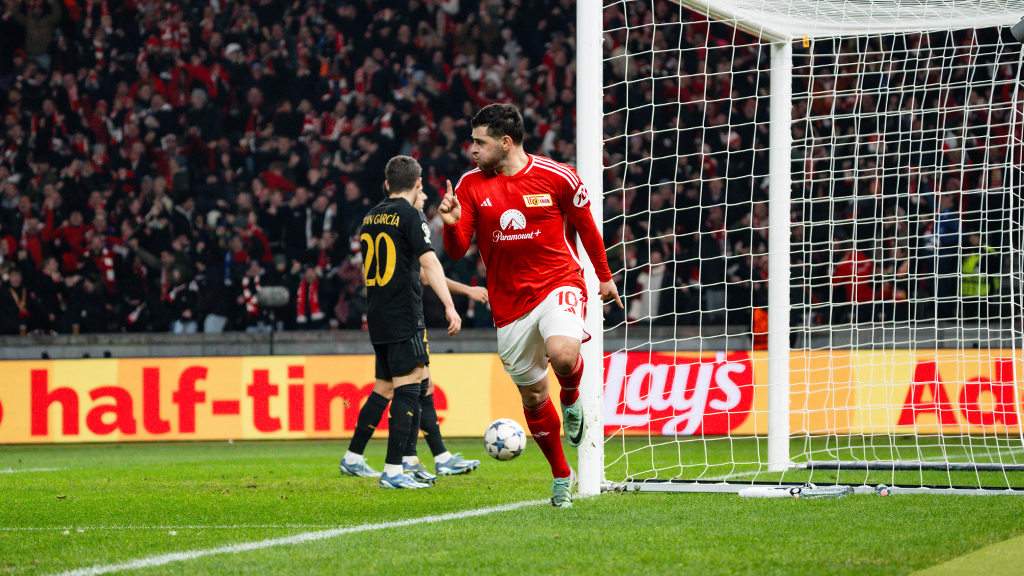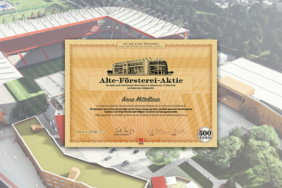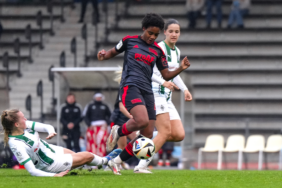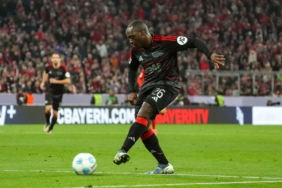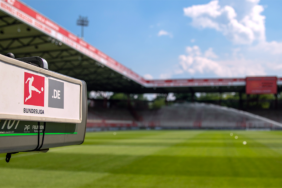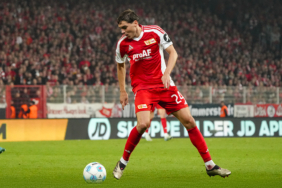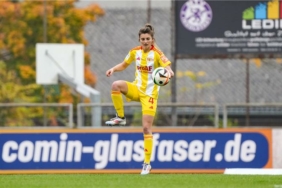Dani Ceballos overlapped down the right-hand side, picking up a backpass from Joselu, it was the culmination of a graceful move started by Jude Bellingham with a ball swept on from the centre-circle. He crossed into the box, across and past Jerome Roussillon, his arms behind him in that most modern of images now that full-backs live in as much fear of the video assistant as they do any winger.
Diogo Leite was next. Shuttling back, he had just reached the left-hand corner of Union’s six-yard box, but the ball was travelling straight at him, fast, at that awkward height between waist and shoulder; too low to chest, too high to take on the thigh. Leite is a charming man with a broad smile whose towering strength belies his demeanour off the pitch, and the impression given by his long and thin limbs. His left hand is often out, he runs with it cocked unconsciously to the side, not dissimilarly to the way Haile Gebrselassie’s was when he would run marathons faster than anyone ever had before.
43 minutes and eight seconds had been played in 1. FC Union Berlin’s last Champions League match against Real Madrid. Leite’s knee came up; his head came down.
The ball pinged into his hand and changed its path, going out of play a heartbeat later, but by then Ceballos was already gesticulating, one hand on his arm, towards the referee, Rade Obrenovic, himself already turning towards the spot, pointing with damning certainty. The whistle was in his mouth, he had seen enough. He was right there.
Ceballos, seeing the spot-kick had been given, crossed the line and picked up the ball. Bellingham came over, they had a chat, presumably with the Englishman asking if he could take it, but the Spaniard continued towards Luca Modric, the player that Union’s new head coach, Nenad Bjelica, had described in his press conference the day before when asked about the relative merits of him and Bellingham, as “the best player in the world.”
Modric took the ball. He has a face like the cliffs of the Atlantic coast, weatherworn, impassive and, somehow, ancient, with puffin’s nest patches of orange and grey beard sticking out of its crags. Though he’s old for a footballer, it’s hard to believe he is only 38.
Leite and Rani Khedira were on the referee, joined by Roussillon, immediately, as Robin Knoche and Janik Haberer looked on impotently. Modric put the ball down on the spot and stepped back, checking the studs on his boots, removing a small clod of turf and looking at it with disgust, for he is a dancer, not a ploughman. Then he gobbed on the floor.
Obrenovic turned away from Leite and Khedira, dismissing them, losing his patience. It had now been 46 seconds since the ball struck Leite.
Roussillon slipped away from the maddening crowd, and he stood mischievously over the ball. He rolled it ever so slightly off its spot with a bright yellow boot, looking as innocent as the wind. The Croatian rolled it back, the kind of imperceptible movement that 99.9 percent of the world’s population would struggle to make look as effortless.
For the briefest of moments, they were toe to toe, the ball between them, with chaos all around. They are the same height, 1.72m, five foot six. Modric didn’t smile, nor did Roussillon. It was as if they were both there but not there, until Union’s left-back walked away. He didn’t smile outwardly, but whether he did inwardly is another matter – a butterfly’s wing only needs to be batted just enough, after all.
Modric had only ever missed four penalties in his entire career before this, the second of which being five years before against Kasper Schmeichel, the man somewhat inexplicably still keeping Rönnow out of the Danish team. He’d put away 22 of them in total but hadn’t scored anything for ten months now, a fact that the World Cup winner, and former Real sporting director Jorge Valdano, mentioned on Spanish TV. Though respected by most for his intelligence and erudition, an unbiased opinion Valdano is not. The longer Modric went without scoring, the more, he said, he wanted him to do so.
He’d had one saved, himself, in the 1984 UEFA Cup Final. So even though it wasn’t decisive – not like this could be – Valdano knew how the penalty kick could agitate the senses like few other things in football.
Rönnow had done his star jumps, though he eschewed the rubber knees favoured once upon a time by Bruce Grobbelaar, then copied by Jerzy Dudek, and used, himself, on occasion. In the stands, memories went back to the first game of the season, at home against Mainz in the Alte Försterei, when he saved two – one to his right and one to his left.
Obrenovic approached him, explaining that he wasn’t allowed to leave his line (though every keeper knows the rules, they’ll, of course, always try to get around them) before leaving the box, his eyes on the stopper all the while, backing away as if from an argument with a man in the street.
Rönnow jumped three more times, his arms pointing towards the top corners, before doing exactly ten small, rhythmic double toed hops on the spot.
Modric stood at the top of his run up for 33 seconds. 33 seconds for Obrenovic to jog over to where Roussillon and Real’s captain, Nacho, were jostling for position to be the first able to get on the front foot should the ball spring their way. 33 seconds that felt like forever.
The Olympiastadion was a cloud of pensive boos and whistles and the bitterest of insults raining down, while the cheering optimism of the thousands of Unioner transplanted from the Waldseite to the Gegengerade was being sucked into the huge echoing spaces under the roof of this foreign stadium that were filling with the fear of the rest.
Union had lost to Real by only a single goal before, of course, that one coming in the 94th minute. As they had to Napoli and to Braga, too. They had been superb throughout, but luck hadn’t been on their side, and the pressure on Union here had been building, ever since Kevin Behrens’ volley had been saved by Kepa – and God only knows how he managed it – in the opening seconds.
Joselu had bent an extravagant shot with the outside of his boot past Rönnow’s back post just a couple of minutes before. His right foot was the wrong foot. He should have used his left; he had all the time in the world to let the ball roll across his body first.
Modric took a quick double step, then seven more, before hitting the ball side-footed, straight down the middle. And though Rönnow had dived to his right, he had sprung off a single foot and he watched the ball all the way onto his other one, half kicking, half bunting it back the way it had came.
There are times when it looks like he can defy physics, like he can turn cartoonishly in mid-air, and this was one of them.
The ball came out to Paul Jaeckel, the centre-half brought into this game somewhat unexpectedly by Bjelica, and he smacked it out of play, punching the air as he did so. The vast bowl exploded in utter bloody relief and in sheer, disbelieving joy.
Rodrygo was over to take the corner in a flash, as the fourth official signalled there was only a minute of added time to play.
But despite the young Brazilian’s initial rush, he quickly remembered, he had that sense imbued in all Real Madrid players that they can conjure goals in the European Cup at will. He took five steps back and waited a further 19 seconds before hitting a deep cross, the ball’s swinging out and back into the six-yard box. Rönnow plucked it out of the sky with two hands, and fell to the muddy turf in his box, chest down, cradling it under his body. He looked up and had the briefest of exchanges with Bellingham.
But then he spotted a gap, jumped to his feet and launched the longest of balls, his heels kissing the freezing air as he kicked the ball out of his hands. He hit it as straight up the middle of the pitch as the penalty just a moment before had been struck. You could have laid a foundation up the length of the Olympiastadion from its trajectory.
It bounced in the space between Khedira and Modric, neither of whom were properly back in place. The ball bounced high where Kevin Behrens flicked it on, towering suddenly, all alone, two-thirds of the way up the pitch. Behrens’ intention only was to move it forwards, and he directed it into the path of David Alaba, but the Austrian international, too, wasn’t ready for this moment.
He sliced horribly while falling backwards, looping the ball up into the path of Kevin Volland.
Volland had a tough start at Union. He got a red card and a huge fine for a rash challenge on Mohamed Simakan in Union’s first loss of what would prove to be a catastrophic run and suffered the ignominy of playing only 74 minutes in the next five games as they stuttered and ultimately slumped to the bottom of the table.
But he had his best performance of the season, scoring the equaliser against Augsburg a fortnight before, adding to it with a superbly taken penalty against Gladbach the next week. From the stands of the Alte Försterei you could see his shoulders had moved back, his neck had straightened, and his chest was puffed out just that little bit more.
Volland’s eyes flashed. He was travelling at the same speed as Lucas Vazquez as they raced goalwards towards the bouncing ball, but he had the advantage, the inside track, and stood up tall as he ran, strong and barrel-chested, giving the defender no chance. Vazquez tried to barge him off balance, but he just bounced off him.
The Real keeper, Kepa, came off his line, but he was never going to get there first. He was helpless, and Volland shot first time with his left. The ball bounced once before hitting the net, and the striker continued his momentum towards the corner flag where he punched the air and slid on both knees across the Ostkurve, but not towards it.
From the award of the penalty to the ball hitting the back of the net, all of this had taken just two minutes and 47 seconds. For two minutes and 47 seconds it seemed that there really could be a football God and that not only was he was looking down on this game, but he was also somehow, not supporting Real Madrid.
Discounted at first, Union had stood up to all of them, Braga, Real and Napoli. That time between Leite’s handball and Volland’s goal wasn’t an aberration, it was a confirmation of all the values and the skill and the fearlessness that had got them into this esteemed company in the first place; and like a great pop song it had all come in under three minutes.
It made me think of when Maradona’s Napoli won their first ever Italian Championship and a piece of graffiti appeared on the walls of a graveyard in the town.
“Guagliu! E che ve sit pers!„
“You don’t know what you are missing.”
Jacob Sweetman. Berlin, Dec. 2023.

